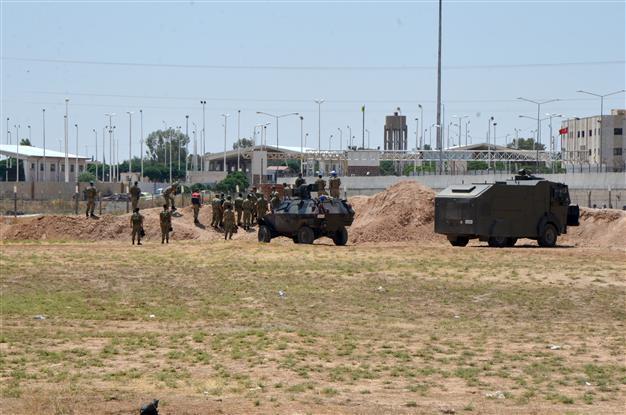Turkey, US agree PYD cannot cross west of Euphrates: Turkish official
Sevil Erkuş - ANKARA

CİHAN photo
Turkey and the United States both agree that the Democratic Union Party (PYD) cannot be permitted to enter an area in Syria in which Turkey plans to establish a zone that will ostensibly be free of jihadists, according to a Foreign Ministry official.“There is no hesitation from the beginning regarding the understanding we have reached with the U.S. They [PYD] will not cross to the west of the Euphrates [River]. They will not perform ethnic cleansing and demographic surgery,” said the official, who asked to remain anonymous, noting that displaced Arabs and Turkmens in the region would also return to their homeland as part of the consensus.
The PYD is also “aware where they must stop,” the official said, noting that the message was conveyed to the group through the U.S. and also through various channels that they should not penetrate into the zone that will ostensibly be cleared of the Islamic State of Iraq and the Levant (ISIL) between Jarablus and Azaz.
After the PYD’s military wing, the People’s Defense Units (YPG), removed ISIL from Tal Abyad in June, officials in Ankara declared that the PYD was more dangerous than the jihadist group, while also accusing the YPG of removing Arabs and Turkmens from the area. Many from the communities, however, have returned to the area now controlled by the PYD.
Turkey and U.S. have agreed in general terms on a plan that envisions clearing ISIL militants from northern Syria by forming an “ISIL-free zone.” The ISIL-free zone will be 98 kilometers long and 40 kilometers wide and situated between the Marea-Jarablus line.
The plan crafted by Ankara and Washington foresees the deployment of Free Syrian Army (FSA) units to the area if ISIL is completely cleared from that particular zone, which would both prevent the PYD from further expanding its influence toward the West and relieving the canton of Afrin from jihadist attack.
Turkey also expects the zone to become a safe environment to shelter Syrians fleeing violence or those who want to return to their homelands.
More anti-ISIL military aircraft will be deployed mainly at the İncirlik Airbase, but other bases as needed, according to the official. Joint anti-ISIL operations with the participation of Turkey will increase in the coming days, as Ankara is waiting for requests by Washington to maintain full-fledged coordination with expected aircraft.
Second phase in train-equip program
The train-and-equip program for putatively moderate Syrian opposition members has launched a second phase of training in Turkey with almost twice the number of Syrians compared to the first round of 54 “train-and-equip” fighters.
British military officials have also arrived in Turkey to join the program, to which a total of seven countries are contributing, the official said.
The effort to train Syrian opposition groups is part of an overall campaign to defeat ISIL militants who have seized large parts of Syria and Iraq since June last year.
US official in Ankara
The U.S. deputy special presidential envoy for the global coalition to counter ISIL, Brett McGurk, met with Turkish officials in Ankara on Aug. 12 to advance the joint cooperation against ISIL.
McGurk’s talks in Ankara came exactly as the U.S. launched its first F-16 fighter missions from Turkey against ISIL targets in Syria. McGurk travelled to Turkey following his meeting with Iraqi Kurdistan’s leader, Masoud Barzani, in Arbil.
















